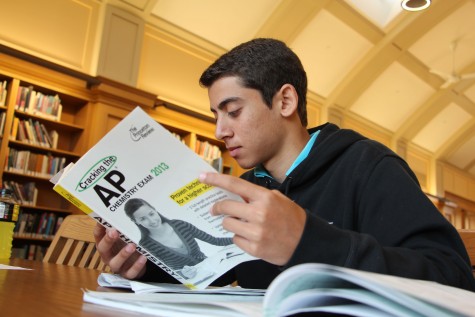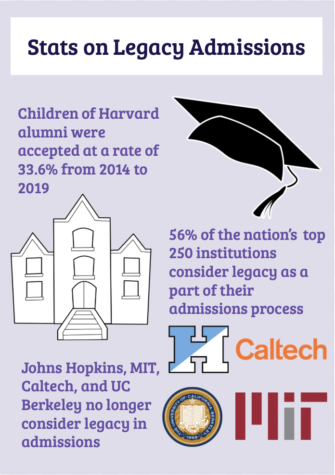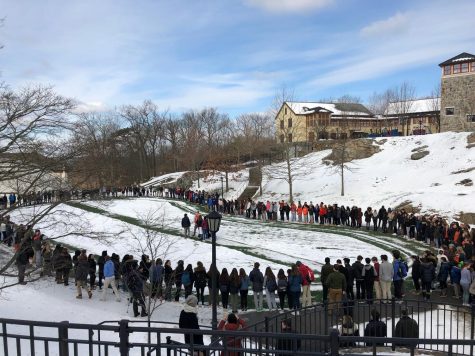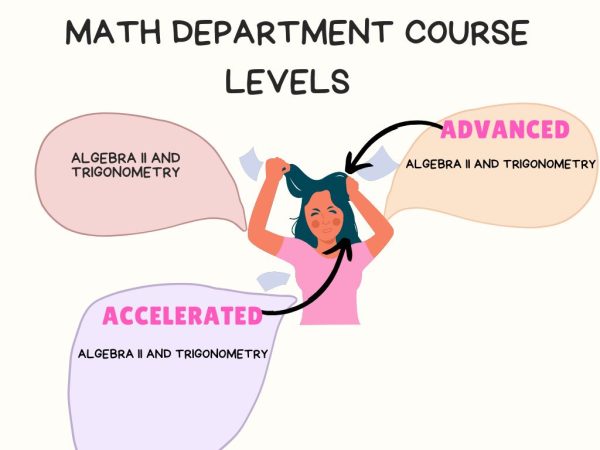Students And Teachers Comment on APs
The AP Program Is Valuable For Underprivedged Students, But Isn’t Neccesary at Hackley
By David Duerr
Hackley is a school which doesn’t need the AP exams to give yet another credential to kids who will do just fine at getting accepted to top-ranked colleges. This is not the case for students attending other high schools with a more academically diverse student population. In my experience, the AP classes are staffed with the best and most experienced teachers, which can be a boost to a group of students in more challenged setting. Indeed it is a perk for these teachers who might not otherwise continue to teach at these schools. What’s more, the AP Board, whatever you might think of their motives, is actively recruiting teachers to solicit more disadvantaged, but academically superior groups who don’t traditionally take AP classes, to do so. For many students of color taking the AP is just not on their radar, placing them at a disadvantage vis-à-vis their white counterparts.

Junior Youssef Asaad studies for his AP Chemistry exam.
In addition to providing a meaningful credential to college-bound students, the AP fulfills another role: it allows students to advance to a higher level course in a given discipline once they reach college. It is a reliable and validated test on a national basis which allows administrators to place students at an appropriate course level. This might actually be valuable for Hackley students who consistently place in the higher levels of AP exams. They will have fulfilled a prerequisite that is accepted across a wide range of colleges.
The criticism I hear about the AP exams is that the courses leading to them tend to be reductive, a curriculum driven by an outside agency, nothing more than glorified test prep classes. In some respects that is true. As an AP French teacher, my goal is to prepare the students to be as successful as possible on the exam. They expect this and so do their parents and my administrators. However, the exams themselves have changed over the years: our French exam has become much less about the study of the language than about using the language to communicate effectively. Grammar has taken a back seat. The new exam also emphasizes the whole French-speaking world, not just “old Europe.” This approach certainly represents a broadening rather than shrinking of our curriculum and reminds both teachers and students that studying a language is meant to open one to the world. The format of the exam also asks the students to do the things any year four curriculum would want: read at a sophisticated level, write a persuasive essay from three sources and perform two impromptu speaking tasks. If this is a straitjacket, it is one with wiggle room.
In the end I would say that AP’s at Hackley should be subject to the usual Hackley process: discussion with a conclusion that is open to a wide interpretation according to departments and individuals within those departments.
David Duerr is the Eigth Grade Dean and AP French Teacher at Hackley. He has taught at a variety of private preperatory and public schools.
The AP Program Is Restrictive, Detrimental, and Unnecessary
By Bill McLay
Over the course of my teaching career, I have undergone an interesting evolution in my view of AP exams. To begin with, in my first year of teaching, I was hired to be the only physics teacher at a school in Charlotte, NC. At the time, I was told I would be teaching two AP Physics classes as part of my load. I had no idea what that meant. Neither did my Department Chair, or anyone else in the department. I was handed a book literally titled College Physics, and told they would try to get me some copies of AP materials. So I went about teaching what I thought I should teach. It was not until late March that I finally got to see what was on the AP Physics exam, which of course would be held in May. Have you ever been given a major assignment, and then the day before it is due you realize that you lost the last page of instructions, that was how I felt. I had not covered nearly enough material. I felt bad for my students, and in the end, 68% passed the exam (the fact that the national average that year was 62% only made me feel a little better).
That summer, I attended a week-long AP Institute to better prepare for teaching that class. I learned quite a bit, and the next year I was better prepared. Yet still, by the time the exam hit, I had not covered light diffraction, and all of Modern Physics. My passing rate rose to 86%. Each year I got better at teaching the curriculum. I was able to get my students more practice, and by the time I was teaching in Atlanta, I was teaching 150 students AP Physics, with a 92% passing rate. In fact, AP Physics was the most popular class at the public school where I taught. I was a machine, pumping out these results. In addition, many of my students would visit from college and tell me how they were often tutoring other students in Physics. Many others were so happy to get their science credit taken care of because they were studying Business or a Liberal Arts major, and they did not want to take any other science. I always saw this as a great opportunity for those Non-Science kids to get that credit, and for the Science kids to be able to start higher-level classes as freshmen. To me, AP Physics was the greatest.
Then a shift seemed to occur in the world of AP. I am not sure how or when, but the system changed. Suddenly there were AP versions of just about everything. Parents wanted their kids in AP not for the opportunity to learn something at a higher level, not even to get credit for a class, they wanted a resume builder to get into college. Often kids having no business in an AP class were there. They struggled, and they were miserable. Then colleges changed the game by no longer accepting certain scores, or would only take a 5, and even then stopped counting it as credit for the class. In addition, the College Board wanted more material crammed into the exam than before. As it was, I could barely get through what already existed. As much as I loved teaching at the level required for the AP exam in Physics, I began to hate being pinned to its curriculum. If I wanted to do something interesting, yet outside the curriculum, I had no time. I no longer saw AP Physics as the greatest way to teach higher-level Physics. By the time I arrived at Hackley, I no longer taught it.
Now, I feel the entire AP Program needs to be scrapped. It no longer serves the same purpose it did 20 years ago. I am not saying to get rid of higher-level classes that teach things similar to the AP curriculum, but to jump through all of the College Board hoops takes too much away from the meaning and purpose of these classes. The fact that so many parents want their kid in any class that has “AP” in the name because they see it as the path to college means that the program is broken. If schools have a robust program run by well-trained and competent teachers, then the students will be well prepared for college. In the end, that should be our goal.
Bill McLay is a physics teacher and former science department head at Hackley. He has extensive experience teaching AP Physics.
Ensure All Students Can Use AP Classes To Distinguish Themselves
By Isabella Yanuzzi
I believe that Hackley should have an AP English class. Not only would an AP English class give students interested in the subject another opportunity to expand their knowledge, but it would also provide recognition for students who are applying to college.

Junior Jarrod Gerstein studies for his AP Computer Science exam.
The class would be a way for students who want to pursue English beyond the required grade level classes to get the involvement they want without needing to add a specific minor to their schedule. An AP English class would also give students the opportunity to read and analyze new books and poetry. The books at Hackley change slightly from year to year, but some books remain the same. Having a class where the books are not completely set in stone would give students more insight into the literary world.
It is amazing that all Hackley English classes are taught at an AP level, but when a student is applying to college it can be difficult to distinguish oneself from other applicants if one wants to major in English. At Hackley there are many opportunities to take an AP or accelerated Science or Math course. For example, Hackley offers AP Stats, Calculus-based AP stats, AP Calc AB, Acc. AP Calc AB, AP Bio, Advanced Bio, AP Physics, and AP Chem, only to name some of the available courses. Yet, the Hackley English department doesn’t have an accelerated, advanced, or AP class. Because of this, it is more difficult for the Hackley student who is passionate about English to pursue his or her interests, rather than a more math and science oriented student. Yes, colleges will be aware that the student is applying from Hackley where all the English is at an AP level, but if a student chooses to take an extra English class it distinguishes them from others. There are minors available, but an AP course would provide the opportunity for students to double up in English majors and really pursue their interests.
Isabella Yanuzzi is an Eleventh Grade Student at Hackley.








